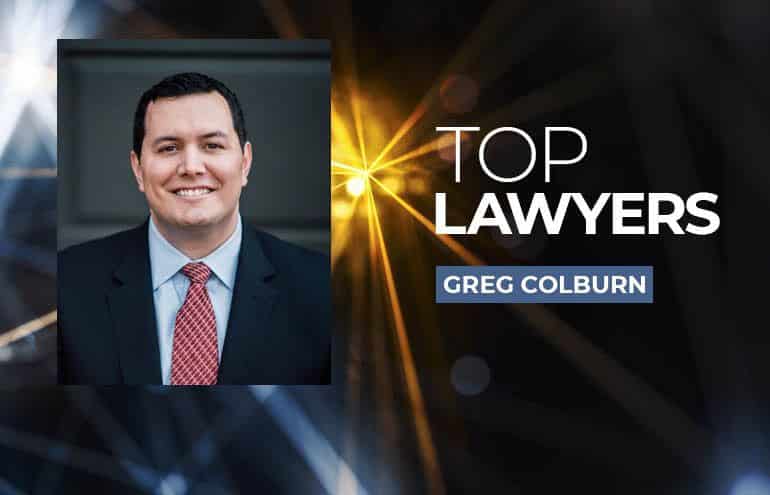What does it take to become a successful lawyer in your particular niche? In a series of interviews for the Estrin Report, Chere Estrin profiles top lawyers from all types of practices. Here, we highlight their top tips. This week, we feature personal injury lawyer Greg Colburn, who says success requires both grit and empathy.
Greg Colburn
Founder
Colburn Law
Seattle, WA
LinkedIn
Seattle personal injury attorney Greg Colburn was a promising baseball player at the University of Washington. But then he suffered a debilitating injury. “I wanted to play professional baseball or become a surgeon,” says Colburn. “I became a personal injury lawyer because I was injured on the job and became frustrated with lawyers.”
Coburn was 22 years old when he fell from the roof of a building while working for a general contractor. “Although I landed on my feet,” Colburn recalls, “the main weight-bearing joints in both my feet were destroyed. I needed reconstructive surgeries and spent two years in a wheelchair.” Colburn understands how injuries take a toll on someone physically and emotionally and focuses his personal injury practice on negligence claims.
What Does It Take to Build a Successful Law Practice?
“I like to think that I possess three important traits that are not only important to professional success but in life: grit, empathy and the ability to effectively strategize,” says Colburn. “Without grit, I’m not a lawyer, I don’t have my law firm, I’m not married to my wife, I don’t have our two beautiful children, and I’m not able to do the physical activities I enjoy. Grit saved my life after my injuries.”
Colburn adds that “a personal injury lawyer without empathy is an insurance adjuster with a law degree. Empathy allows me to listen to my clients, discover their real stories and persuasively fight for them. Strategizing allows us to create roadmaps and game plans for cases so that we are proactive rather than reactive.”
Five Things You Need to Be a Top PI Lawyer, According to Greg Colburn
According to Colburn, top lawyers need to develop these traits:
1. Curiosity — You Need an Eagerness, Not Just Willingness, to Go Down the Rabbit Hole
Personal injury lawyers are detectives. You cannot be successful without curiosity. You must be willing to entertain all possibilities when examining a potential case.
As an example, early in my career, I represented a woman who was hit in a crosswalk by a left-turning driver. She suffered catastrophic injuries. The driver had minimal insurance. Buried in one of the documents obtained through public records requests was a witness statement in which the witness commented that the intersection was dangerous.
So, I got in my car and drove to the intersection around the same time of day my client had been hit. I stood at the intersection for an hour and simply watched traffic. As I stood there, I saw a few close calls between left-turning drivers and pedestrians.
I made more public records requests and, ultimately, found a letter from a large company located at the corner of the intersection. The company wrote a letter to the City of Seattle notifying the city that the intersection was dangerous and detailing the reasons why.
That letter opened the floodgates and led to a successful outcome for our client.
2. Be Personable — Nobody Wants to Share Their Inner Thoughts With a Jerk
To learn about my client’s personal injury case, it seems obvious, but I have to be personable for my client to trust me and open up to me. Nobody wants to share their inner thoughts and feelings with a jerk.
Also, on some level, we are all salespeople. When I meet with a potential client, like it or not, I am selling myself and my law firm to that potential client. I don’t need to be a car salesman about it, but I need to be prepared to tell the potential client why we are the right legal team to hire.
I was once told by an older attorney that to sign new clients, I needed to wear a suit and tie. I have to admit — I hate wearing a suit and tie. Soon after I started my firm, I was contacted by a potential client who had suffered catastrophic injuries due to the fault of a delivery driver. Upon arriving at the potential client’s home, I saw a lawyer leaving dressed in a suit and tie. I was wearing jeans and a collared shirt.
The potential client invited me into his home where we sat on his couch and talked for a couple of hours. At first, we didn’t even talk about his case. We just talked, like we were sitting in a bar having a beer. He hired me that day. I later asked him if he was bothered by my attire when we first met. He told me that he had met with 12 lawyers, but I was the only one that didn’t have a suit and I didn’t talk like a lawyer. That did it for him.
3. Empathy — You Can’t Tell Your Clients’ Stories If You Don’t Feel Their Stories
Empathy enables us to listen to our clients — to truly listen and hear them. Empathy lets you hear what your clients aren’t specifically telling you. When your client, a single mother of two small children, tells you that her neck pain is frustrating and difficult to manage, empathy allows you to ask her how her neck pain affects her ability to interact with and care for her children.
When I am taking the delivery driver’s deposition and he describes the collision scene, empathy allows me to feel his fear and guilt, and to ask him what his employer could have done to better train him to avoid this type of incident.
When you show that person empathy, they’re more likely to be frank and truthful.
4. Battle-Picking
This is a big one for personal injury lawyers. Our clients are experiencing some of the worst, if not the worst moments in their lives when we meet. They can be frustrated and angry. Sometimes, the frustration and anger get misdirected at you.
Rather than battling with the client about who is right or wrong, listen to the client to communicate they know you understand their situation. Don’t argue — pick another battle worth winning.
Years ago, I worked on a case for two very difficult clients. Everyone else on the legal team became so frustrated that they wanted to withdraw. I was the lone holdout. The cases settled well into the six figures. When the clients came in to discuss the final settlement offers, for some reason the clients believed everyone else on the team had championed their case and [said] I needed to learn from them. Rather than arguing with the clients and trying to correct them, I recognized that even if I won that battle I would lose the war. So, I let it go and tried to learn from that experience.
The clients were happy with the firm and had the closure they needed.
5. Execution — Say What You Mean and Do What You Say
If you tell a client that you’re doing to do something, do it. If you tell an insurance adjuster to accept your client’s final offer or you’ll file suit, you had better file suit.
Last year, I represented a teenage boy with significant bite injuries to his arm, suffered in a dog attack. I made a policy limits demand to the dog owner’s homeowners’ insurer. The insurer offered a pittance. The same day we received the offer, we filed a lawsuit and had the dog owners served. We moved through litigation with a full frontal assault and the insurer paid. We told them what would happen if it didn’t pay. We executed on that promise.
Another example is our online marketing strategy. When I went solo, I made the decision to invest heavily in sustained, consistent, long-term online marketing focused on SEO. The first year didn’t show much in terms of return. Then, the switch flipped. We consistently rank not only on the first page but in the first three organic search results for our major keyword targets. At the start, we considered our options, developed a strategy and executed that strategy.
Read Chere Estrin’s full Greg Colburn interview on Medium.
Illustration ©iStockPhoto.com.
Subscribe to Attorney at Work
Get really good ideas every day for your law practice: Subscribe to the Daily Dispatch (it’s free). Follow us on Twitter @attnyatwork.
















